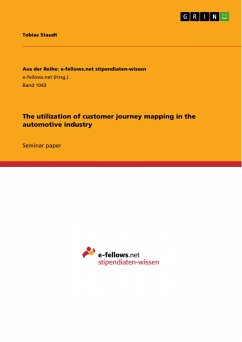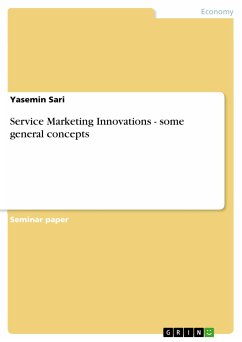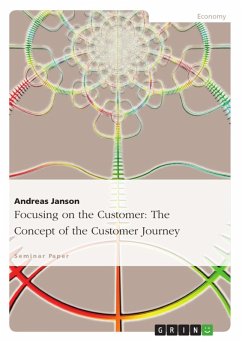Seminar paper from the year 2014 in the subject Business economics - Offline Marketing and Online Marketing, grade: 1,2, HHL Leipzig Graduate School of Management, course: Service Retail and Marketing, language: English, abstract: Commoditized products and volatile market environments frame the setting that companies are facing today. Thereby, the importance of differentiation as key to company's growth is more relevant than ever. It is widely assumed that differentiation often refers to products or market positions. However, more recently, the concept of Experience Based Differentiation (EBD) emerged as an idea for companies to build sustainable relations and loyalty by delivering a superior, differentiated experience to customers. Managers have become increasingly aware that customers are their most valuable assets. However, pure Customer Relationship Management (CRM) is not sufficient anymore. Thus, Customer Experience Management (CEM) takes CRM to the next level by integrating customer experience (CEx) and emotions during interactions into consideration (Fatma 2014). Tracing the considerably increasing number of customer touch points and derive so called customer journey maps, helps companies to understand the broader reasons of performance gaps and thus address root causes. A recent study by McKinsey & Company (2013) revealed that companies that are able to map and optimize relevant customer journeys reinforce superior CEx, reduce churn and increase revenue, and, as a result, built sustainable relationships. In addition, greater employee satisfaction and an increased effectiveness of cross-functional collaborations have been observed. However, most companies fail to strategically align and manage the CEx across all touch points and miss a great opportunity to differentiate. This gives relevance to a study on the potential of Customer Journey Mapping (CJM), as a way for the marketing management to understand CEx during all interactions. In the process of the present work, the concepts of Customer Experience (CEx), Customer Experience Management (CEM), Customer Journeys (CJ), as well as Customer Journey Mapping (CJM) are important. Therefore, the basic idea of these concepts will be characterized and explained in this sub-chapter. The terms CEx and CEM have been introduced to the marketing management several years ago and have its roots in the concepts of service quality and customer service, which evolved during the eighties and nineties (Drotskiie, 2009, p. 363). Today, a common understanding of the frequently cited concept of CEx is "the user's interpretation of his or her total interaction
Dieser Download kann aus rechtlichen Gründen nur mit Rechnungsadresse in A, B, BG, CY, CZ, D, DK, EW, E, FIN, F, GR, HR, H, IRL, I, LT, L, LR, M, NL, PL, P, R, S, SLO, SK ausgeliefert werden.









